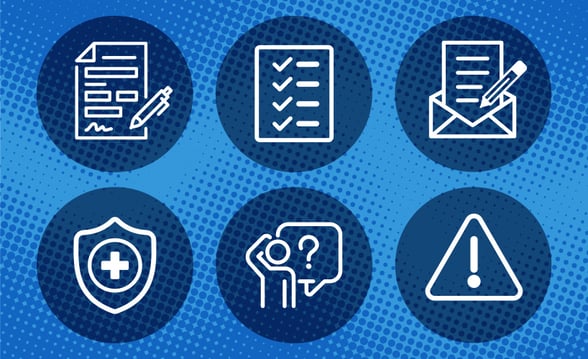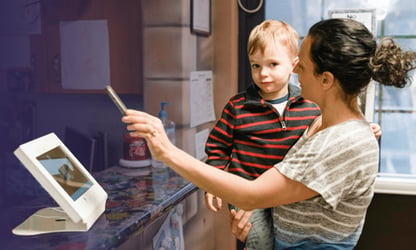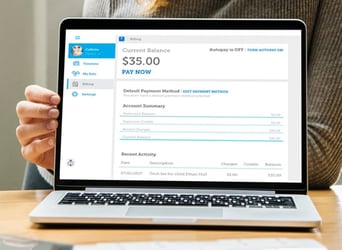
As a childcare provider, you need tounderstand the importance of going beyond the basics. Preschool extracurricular activities, like after-school classes for preschoolers or fun preschool clubs are where the magic happens.
These enrichment activities for preschoolers provide opportunities for hands-on learning, creativity and social connection. They also help children develop essential motor skills.
A 2022 study found that 4- and 5-year-olds who engaged in extracurricular physical play showed much better motor coordination than those who didn’t. Pretty impressive, right? Beyond that, managing extracurricular activities for young kids also helps them develop vital social and emotional skills.
For parents, knowing their child is engaged in enriching activities at your center gives them peace of mind. They know their child is not just getting ready for school; they’re getting prepared for life.
Table of Contents
- Benefits of Preschool Extracurricular Activities
- Popular Preschool Extracurricular Activity Ideas
- Structuring and Scheduling Activities in a Preschool Setting
- Tips for Implementing Successful Preschool Enrichment Programs
- How Vanco Supports Preschool Activity Management
- FAQs
- Final Thoughts
- 100+ Free Editable and Printable Templates to Save Tons of Time
Benefits of Preschool Extracurricular Activities
Supporting Social and Emotional Growth
It’s amazing how quickly kids can go from being shy and unsure to suddenly wanting to play with every child in the room. After-school programs for early learners are a great way to get them out of their shells.
These programs help children build friendships, practice teamwork and boost their confidence. Who knew something as simple as a preschool club could teach a child to share a toy, wait their turn or express excitement over someone else’s achievement?
The real magic comes when these activities allow children to explore emotions in a safe space. When a child gets frustrated during an art project or disappointed when they lose a game, they learn valuable lessons in emotional resilience. Sharing those feelings with their peers strengthens social bonds.
Sometimes, the best way to learn emotional intelligence is to be surrounded by other kids going through the same experiences. Creative programs for young learners are perfect for this, as they encourage children to express themselves in ways they might not even know how to do yet.
Encouraging New Interests and Talents
It’s easy to forget just how curious preschoolers are. One minute, they’re obsessed with dinosaurs; the next, they ask if they can take up painting or ballet. Enrichment activities for preschoolers are the perfect way to expose them to new interests, skills and hobbies.
Maybe a child will discover they love music or surprise you with a sudden talent for pottery (you never know with these little ones). Offering a variety of activities for young children, like music, art and movement, gives them the chance to explore different areas they might not get in a typical classroom setting.
From dance to drawing to storytelling, these extracurriculars allow children to explore their creativity, try new things and possibly even find a passion that sticks. What starts as a simple preschool club could evolve into a lifelong interest.
Enhancing School Readiness and Motor Skills
When you think of extracurriculars, you might not immediately associate them with school readiness. However, these activities teach preschoolers essential skills that will help them when they enter kindergarten.
Things like fine motor skills and hand-eye coordination might not sound exciting, but they’re a big deal. Whether a child is coloring, building with blocks or participating in hands-on learning for preschool classrooms, they’re getting better at controlling their movements, strengthening their muscles and improving their attention span.
These activities also reinforce cognitive development. By engaging in preschool readiness and enrichment programs, children are learning to focus, follow directions and practice problem-solving, all skills that will serve them well when it’s time to sit in a classroom and follow a schedule.
Also, don’t forget about the benefits of creative preschool programming, which helps kids think outside the box and be adaptable to new situations. The more you expose them, the more ready they’ll be for what comes next.
Popular Preschool Extracurricular Activity Ideas

You probably didn’t get into early childhood education because you love filling out sign-up sheets or explaining the pickup schedule over and over. But here you are, trying to build meaningful preschool extracurricular activities that fit into a preschool day's chaotic, joyful rhythm.
You know how much these programs matter. You’ve seen a shy kid emerge from their shell during a puppet show. You’ve watched a toddler discover rhythm in music class like it’s some breakthrough. Enrichment activities for preschoolers aren’t just “extra.” They’re often the difference between passive learning and authentic, curious engagement.
Let’s talk about what works.
Music and Movement Classes
There’s nothing quite like watching a room full of toddlers lose it in the best way during dancing, sing-alongs and rhythm games. It’s loud, it’s wobbly and it’s the kind of chaos that’s packed with value.
You already know how essential music, art and movement are for young children. But sometimes, it’s easy to forget how much development is packed into those shaky tambourine and freeze-dance games.
These moments support motor development, emotional expression and coordination. Plus, it burns just enough energy to make circle time survivable.
Need a solid resource? This music and movement activities guide is worth bookmarking.
Arts and Crafts Clubs
There is glitter everywhere, yet you keep offering themed projects, seasonal crafts and open-ended art because you’ve seen what happens when a child is handed a paintbrush and zero expectations.
Arts preschool clubs and special programs are a sweet spot for creativity. They help develop fine motor skills and patience, even when the glue stick is applied like a frosting tube. You’re also laying the groundwork for making choices and early design thinking.
Check out these preschool craft suggestions for fresh ideas that don’t require a 12-step cleanup plan.
Sports and Physical Enrichment
Soccer, tumbling, yoga and balance exercises aren’t just about movement; they’re about boundaries, focus and cooperation. This sounds lofty until you realize these are often the only times preschoolers willingly follow directions.
Managing extracurricular activities for young kids means knowing when they need structure and when they need to move. This kind of physical enrichment channels energy productively and sometimes it’s also about preventing chaos in the classroom after nap time.
Plus, you’re building confidence and coordination while helping them learn to take turns, which (let’s be honest) is a full-time job in itself.
STEM for Early Learners
Forget the pressure to turn preschoolers into mini engineers. Science, technology, engineering and math (STEM) enrichment activities for preschoolers work best when they’re tactile, simple and slightly messy. Think building blocks, baking soda reactions or sorting objects by shape and color.
This idea is hands-on learning for preschool classrooms at its best. Kids get to make predictions about test outcomes and accidentally create new colors by mixing paint. It’s not about getting the “right” answer; it’s about building the foundation for curiosity and critical thinking.
Language and Literacy Enrichment
Here’s where you see real engagement: storytelling circles, silly rhyming games and even simple songs in another language. These moments build vocabulary and spark a love for communication.
These preschool readiness and enrichment programs give kids tools they’ll use daily for the rest of their lives. You’re not trying to create fluent readers by age 4, but if a child learns how to express an idea or ask a question clearly, that’s a win.
These also make great inclusive extracurriculars for preschoolers, especially those who thrive with extra verbal structure or benefit from early exposure to different sounds and expressions.
Drama and Performance Activities
It might seem like dress-up and silly voices, but puppet shows, short plays and costume role-play serve a serious purpose: helping kids process emotion, learn empathy and find their voices, literally.
You’ll often find that the quietest kids suddenly light up when they get to play a dinosaur or a doctor. These creative preschool programming options create space for risk-taking in a low-pressure environment. No one cares if the performance makes sense; what matters is that they feel confident being part of something.
Nature and Gardening Clubs
There’s something about dirt that works for preschoolers. Maybe it’s sensory; perhaps it’s freedom. Outdoor discovery, planting and observing growth are some of a childcare center's most engaging ideas for enrichment.
You don’t need a full-blown garden. A windowsill with sprouts or a bucket of soil and seeds is often enough. It connects kids to the world around them and slows everything down in a calming way for them and you.
Looking for nature-based activity inspiration? These outdoor activity ideas and gardening guides are a great place to start.
Structuring and Scheduling Activities in a Preschool Setting
If you've ever tried to introduce preschool extracurricular activities without a plan, you already know chaos isn't nearly as cute as you'd think. Timing is everything. Some programs fold enrichment activities for preschoolers into the day’s natural flow.
In contrast, others save them for after-school programs for early learners when naps are over, snacks are made and attention spans are short.
Short bursts are your best friend. Preschoolers aren’t wired for hour-long chess tournaments. Most preschool clubs and special programs click best in 10–20 minute blocks, two to three times a week. It's enough to spark excitement without pushing into “I’m tired” territory.
Rotating childcare center enrichment ideas keep kids curious (and teachers sane). One week, it’s music, art and movement for young children; the next, it’s messy science. Managing extracurricular activities for young kids is an Olympic event, but the benefits of structured play in early childhood make it all worthwhile.
Tips for Implementing Successful Preschool Enrichment Programs
You already know enrichment activities for preschoolers make a real difference. However, making these programs successful takes more than setting up a few paint stations and hoping for the best. It takes planning, communication and staying flexible without losing your mind.
Choosing Qualified Instructors or Partnering with Local Programs
When staffing your after-school classes for preschool, not just anyone will do. You need instructors who understand how chaotic and brilliant hands-on learning in preschool classrooms can be and who won’t panic when a science experiment goes awry.
Partnering with local music schools, libraries or children’s museums can bring significant expertise to your preschool clubs and special programs. When your instructors are passionate about early childhood enrichment, kids pick up on it fast.
You’ll see it in how they light up during a drumming circle or when they explain how they built a tower taller than themselves using only pool noodles.
Choosing great partners for your creative preschool programming saves you from being the music teacher, art instructor and coach all at once. Nobody needs that kind of stress.
Communicating with Parents and Caregivers
You probably already know that sending one email about your new preschool readiness and enrichment programs isn’t going to cut it. Parents are juggling a thousand things. If you want their attention, you must keep information short, colorful and impossible to miss.
Flyers, newsletters and event recaps aren’t optional. They’re your best tools for managing extracurricular activities for young kids in a way that feels organized instead of chaotic. Plus, regular communication builds trust, making it much easier to fill spots in your after-school programs for early learners and keep families invested long-term.
If you want a shortcut, Vanco’s Child Care Kit has templates that make creating flyers and newsletters feel almost too easy.
Creating Inclusive Programs for All Learners
It’s easy to say your preschool clubs, early childhood enrichment and special programs are for “everyone,” but making that true takes real effort. Inclusive extracurriculars for preschoolers mean adapting activities so that every child, no matter their learning style or ability, can join in without feeling left behind.
Sometimes, that means adjusting a music session for sensory-sensitive learners. Other times, it means offering multiple ways to participate in a messy art project. When you build affordable enrichment options for childcare that consider all kids, your early childhood enrichment programs stop feeling like “extras” and start feeling like essentials.
Besides, helping every child find their place is one of the real benefits of structured play in early childhood, not just the obvious ones like better fine motor skills or sharing without a major meltdown (although those are pretty great, too).
Tracking Participation and Measuring Impact
You don't need a PhD in statistics to know whether your childcare center enrichment ideas work. A simple attendance log, a few parent feedback forms and observing your creative programs for young learners will tell you almost everything you need.
Tracking participation helps you fine-tune your approach and shows you the real benefits of structured play in early childhood over time. You’ll spot which activities bring out the best in kids and which seem like a good idea until five minutes in.
Measuring impact also gives you real data to share with families while promoting your preschool extracurricular activities. It’s not bragging if you can back it up with smiling photos, enthusiastic quotes and a full signup sheet.
The bottom line? When you approach managing extracurricular activities for young kids with care, creativity and a sense of humor about the unexpected, you’re setting everyone up for success, including yourself.
How Vanco Supports Preschool Activity Management
If managing preschool extracurricular activities feels like running a small nation, you’re not alone. Between juggling after-school programs for early learners, brainstorming childcare center enrichment ideas and trying to fit music, art and movement for young children into a packed schedule, it’s a wonder you remember your name some days.
That’s why preschool management with Vanco isn’t just helpful; it’s sanity-saving. You can organize preschool clubs, affordable enrichment options for childcare and special programs without a whiteboard takeover or 50 sticky notes on your desk.
What about collecting tuition? Vanco's billing and recurring payments are so easy that you’ll wonder why you tolerated the chaos.
You’ll finally have time to focus on what matters: designing creative preschool programming, supporting inclusive extracurriculars for preschoolers and promoting the benefits of structured play in early childhood.
FAQs
What are the best extracurricular activities for preschoolers?
Creative preschool programming, like music, art and movement for young children, sparks imagination. Hands-on activities, like sensory play or beginner yoga, are excellent choices.
How often should enrichment programs be offered in childcare centers?
Aim for preschool extracurricular activities twice a week to balance structure and fun.
How do I find instructors for preschool clubs and classes?
Look for local artists or educators passionate about early childhood learning.
Can extracurriculars help with school readiness?
Yes! Preschool readiness and enrichment programs teach vital social and cognitive skills.
What’s the best way to collect payments for enrichment programs?
Use a simple digital payment system for smooth transactions.
Final Thoughts
You’re not just adding activities; you’re shaping their future. The right mix of enrichment activities and inclusive extracurriculars for preschoolers brings out their confidence, curiosity and creativity.
Whether you’re managing preschool clubs and special programs or juggling hands-on learning for preschool classrooms, the benefits of structured play in early childhood always show up.
So, keep going, build on what’s working and remember that you have the vision to make creative programs for young learners unforgettable.
100+ Free Editable and Printable Templates to Save Tons of Time
We've prepared something special for you — 100+ user-friendly templates to make your important work a little easier. Because the work you do with children matters very much and you deserve tools you need.
Get the Full Collection with Just 4 Simple Steps: Assembly Required (0 Minutes)
Step 1: Click button
Step 2: Download 100+ ready-to-use templates
Step 3: Implement immediately
Step 4: Experience efficient childcare management












